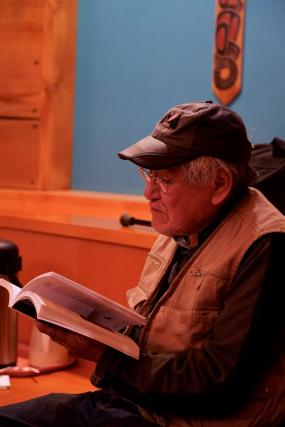Alzheimer’s disease is the leading cause of dementia in older adults and the most rapidly increasing cause of death in the U.S. Effective strategies are urgently needed to prevent and treat this major threat to public health, including better diagnostic tools and more information about Alzheimer's disease in diverse populations.
Recent evidence confirms that Alzheimer’s disease is a major health concern for American Indian and Alaska Native communities. A 2014 report by the US Census Bureau projects that the proportion of American Indian and Alaska Natives aged 65 and older will more than double in the next 3 decades, from 9.2% of the overall American Indian and Alaska Native population to 22.9%. Compared to the US general population, American Indian and Alaska Native elders are at greater risk of numerous acute and chronic health conditions, including some that are risk factors for dementia. They also suffer more co-occurring physical and mental health conditions and have limited access to timely healthcare.
Emerging needs of the aging American Indian and Alaska Native population must be identified, and improvements must be made in dementia screening and diagnosis. For clinics and community organizations, we offer resources and educational materials on Alzheimer's disease and symptoms of dementia, including culturally tailored brochures and informational posters. We have designed brochures for waiting rooms and presentations about dementia for clinic providers and staff. Powerpoints/slides of our clinic outreach presentation and Indian Health Services Providers are available for download in the material list below.
Clinic and Elder Presentation & Outreach Material:
Natives Care: Understanding Alzheimer’s Disease and Dementia is a new outreach program that supports Washington State tribal clinics working toward improved health outcomes for the American Indian and Alaska Native (AI/AN) elder population. Please explore and share the poster and outreach brochure below.
-Natives Care Poster: Continue to Tell your Story (Download PDF)
-Natives Care Outreach Brochure (Download PDF)
Natives Care Clinic Outreach Presentation (Download the Powerpoint): Understanding Alzheimer’s Disease and Dementia - a 45-minute in-person presentation for clinic leadership and staff that aims to improve their knowledge of AD and dementia diagnosis, treatment, and prevention and inform them of research opportunities. Credit: Meghan Jernigan, MPH (Choctaw), Project Lead Cindy Gamble, MPH (Tlingit), Tribal Liaison. Collaborators: Partnerships for Native Health at the Washington State University and the Alzheimer’s Disease Research Center of the University of Washington.
Training
Indian Health Services Provider Training: Diagnosis of Dementia in Primary Care (Download PDF of slides)
This set of slides by Blythe S. Winchester, MD, MPH, is a provider training with the following objectives: Understand the steps in work-up for dementia • Identify the basic ways to test for cognitive impairment and dementia and how to use those tests in different settings • Understand the steps in delivering a dementia diagnosis
The Native Elder Caregiver Curriculum
Native Elder Caregiver Curriculum (NECC) (Download at NRCNAA website) is a 265-page training resource for families and caregivers serving rural American Indian elders, made available through the National Resource Center on Native American Aging, Center for Rural Health, University of North Dakota. The NECC has been designed as a tool to assist caregivers who have the responsibility of caring for their elders. The NECC curriculum focuses on topics that have been identified by elders and caregivers in rural Tribal communities as being useful in the provision of community‐based elder‐care.
>>>Take Me Back to the Indigenous Aging Resources homepage
Calendar of Events
This calendar includes events offered by Partnerships for Native Health across the region & Community talks and programs for people living with memory loss from the UW ADRC/Memory and Brain Wellness Center.



